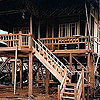 |  |
The country is rich in natural resources While 90% of the population is engaged in agriculture, oil and gas contribute 70% of total export earnings and 60% of the government revenues.
However, fluctuations in world prices of traditional export commodities have led to a change in recent years in the structure of the economy. Tourism is gaining a more important sector as a foreign exchange earner. To production and growth in the industry, the government has formulated new policies and improved facilities. Significant progress has been made in communications and transportation and since 1976, Indonesia has had its own communications satelite system which has enabled rapid expansion of telephone, television and broadcast facilities to all 27 provinces.
Air and sea ports are being extended to cater to the growing traffic on both domestic and international sectors, of passengers as well as freight.
Besides oil and liquefied natural gas (LNG), forestry products, rubber, coffee, tea, tin, nickel, coper, palm products and fish make important contributions to export earnings. In recent years a number of steps have been taken to promote and stimulate non-oil exports which include handicrafts, textiles, precious metals, tea, tobacco, cement, fertilizers as well as manufactured goods.
Indonesia maintains a liberal foreign exchange system and has few restrictions on transfers abroad, and in general freely allows conversions to and from foreign currencies.
Bank Indonesia, the Central Bank, maintains the stability of the Indonesian Rupiah and reviews the exchange rate in terms of other currencies on a daily basis. The Rupiah is linked to a basket of currencies of Indonesia's major trading partners. The unitary exchange rate allows for fluctuation. With the objective of a more equitable distribution of development gains, the government gives high priority to expansion in the less developed regions of the country.


0 komentar
Posting Komentar